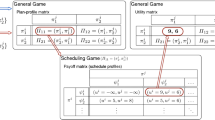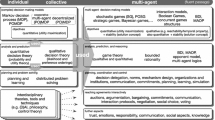Abstract
In this paper we present CODMAPS, a COst Distribution Method for Agent Planning Systems. The strategy is based on individual distribution of cost and competitive behavior.
Our model emulates how human agents work in expert groups. They all share a common objective, however, they also have individual interests and try to steer the planning process towards their own goals. Two opposing trends coexist within the set: global co-operation and individual utility maximization. External evaluation must guarantee the validity of the final plan at global level, but a negotiation and cost distribution strategy must ensure that cost is adequately shared throughout the agent set. We introduce the concept of reluctance as a regulation mechanism to facilitate it. A statistical model allows agents to adapt their attitude towards negotiation depending on their negotiation state vector , which encompasses all history of previous negotiations by the agent.
Previous research into this problem had taken the “rational” approach. A group of agents choose the “best” alternative given the current possibilities. This not only forces the agents to exchange and “understand” other agents' proposals (which is computationally expensive), but also neglects the past negotiation history of each individual agent.
Our approach facilitates distribution of cost across the agent set given the agents' past history and the importance of their constraints. The more taxed an agent becomes the more reluctant it will be to relax, thus pushing other agents less taxed to accept to compromise. It does not need explicit constraint information exchange, thus simplifying the negotiation process.
Similar content being viewed by others
References
S.E. Lander, “Distributed search and conflict management among reusable heterogeneous agents,” Computer Science Technical Report 94-32, University of Massachusetts.
Y. Jin and T. Koyama, “Multiagent planning through expectation based negotiation,” in Proc. 10th AAAI Int. Workshop on Distributed Artificial Intelligence, Bandera, USA, October 1990.
J. Núñez Suárez, G. Winstanley, and R.N. Griffiths, “A skills-based approach to multi-agent planning,” in Proc. 6th Int. Conf. Interfaces 97, Montpellier, France, 1997.
M.S. Fox and S.F. Smith, “ISIS: A knowledge-based system for factory scheduling,” Expert Systems, vol. 1, July 1984.
M. Drummond, “On precondition achievement and the computational economics of automatic planning,” in Current Trends in AI Planning, edited by C. Backstrom and E. Sandewall, IOS Press, 1994.
D.S. Weld, “An introduction to least commitment planning,” AI Magazine, Winter 1994.
A. Sathi and M.S. Fox, “Constraint-directed negotiation of resource reallocations,” in Distributed Artificial Intelligence, edited by L. Gasser and M. Huhns, Pitman Publishing: London, 1989.
M. Georgeff, “Communication and interaction in Multi-agent planning,” in Proc. of AAAI-83, 1983, pp. 138- 142.
E. Ephrati and J.S. Rosenchein, “Multi-agent planning as the process of merging distributed sub-plans,” in Proc. of 12th Int. Wkshp. on DAI, Hidden Valley, PA, May 1993, pp. 115- 129.
A. Chavez, A. Moukas, and P. Maes, “Challenger: A multiagent system for distributed resource allocation,” in Proc. of the Int. Conf. on Autonomous Agents, Marina Del Rey, CA, 1997.
R.G. Smith and R. Davis “Frameworks for cooperation in distributed problem solving,” IEEE Transactions on Systems, Man and Cybernetics, vol. 11, no.1, pp. 61- 70.
A. Namatame and Y. Simoyama, “The design model of complex adaptive systems as a society of rational agents,” in Proc. of the IASTED Int. Conf. Artificial Intelligence and Soft Computing, Banff, Canada, July-August 1997.
E. Ephrati and J.S. Rosenschein, “Multi-agent planning as a dynamic search for Social Consensus,” in Proc. of the 13th Int. Joint Conf. on Artificial Intelligence, Chambery, France, August 1993.
E. Ephrati and J.S. Rosenschein, “Divide and conquer in multi-agent planning,” in Proc. of the Nat. Conf. on Artificial Intelligence, Seattle, Washington, August 1994.
Author information
Authors and Affiliations
Rights and permissions
About this article
Cite this article
Suárez, J.N., Winstanley, G. & Griffiths, R.N. A Reluctance-Based Cost Distribution Strategy for Multiagent Planning. Applied Intelligence 9, 39–55 (1998). https://doi.org/10.1023/A:1008247114430
Issue Date:
DOI: https://doi.org/10.1023/A:1008247114430




